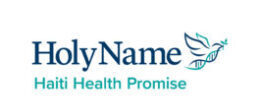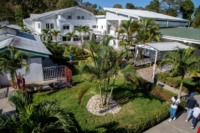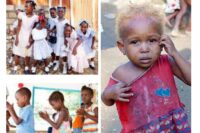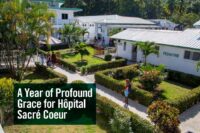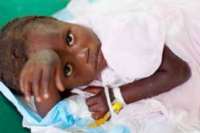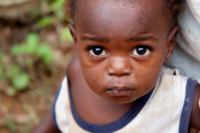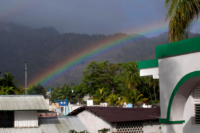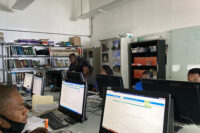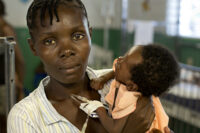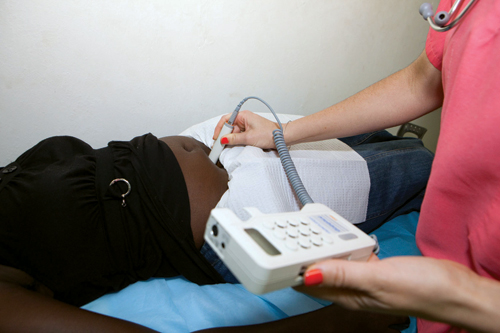 Five months after giving birth to her daughter, Marise expected a more normal sized waistline, instead her abdomen continued to grow. She could no longer fit into clothes worn when she was nine months pregnant. She knew with certainty she was not pregnant again. Something was clearly amiss. One of the lucky 26% of Haitian mothers who gave birth in the presence of a skilled attendant, Marise knew who to turn to for an answer: her obstetrician at Hôpital Sacré Coeur.
Five months after giving birth to her daughter, Marise expected a more normal sized waistline, instead her abdomen continued to grow. She could no longer fit into clothes worn when she was nine months pregnant. She knew with certainty she was not pregnant again. Something was clearly amiss. One of the lucky 26% of Haitian mothers who gave birth in the presence of a skilled attendant, Marise knew who to turn to for an answer: her obstetrician at Hôpital Sacré Coeur.
After examination, her doctor ordered an ECHO test and a sonogram to rule out a tumor or failing heart. The ECHO showed a normal working heart. The sonogram indicated fluid buildup in the abdomen. Three liters of fluid was gingerly siphoned off and a follow up appointment was scheduled. When Marise returned, another sonogram pictured more fluid buildup. Since the first fluid drainage had been clear, without the debris and tissue flecks that might indicate cancer, exploratory laparoscopy surgery seemed the reasonable choice. After draining another six and ½ liters of fluid, the remnant of a damaged left ovary was spotted and then teased out in small pieces to resolve the problem successfully.
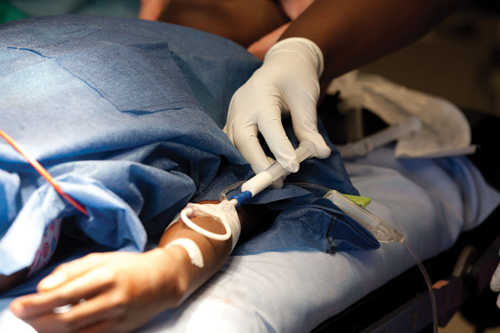 With what is an unremarkable surgery in the US, Marise once again beat the odds in Haiti. Had she not given birth at Hôpital Sacré Coeur, she could easily have been one of the 630 out of 100,000 Haitian women who die in childbirth.
With what is an unremarkable surgery in the US, Marise once again beat the odds in Haiti. Had she not given birth at Hôpital Sacré Coeur, she could easily have been one of the 630 out of 100,000 Haitian women who die in childbirth.
Sterile instruments held by trained hands cut her umbilical cord, not the routinely used rusty knife or unsterile machete. Like most US infants, her child was immediately encouraged to breathe, airways cleared out and body functions closely monitored. Had Marise given birth on the dirt floor of her house, her daughter might have been dragged aside and left for dead if she had not immediately breathed on her own.
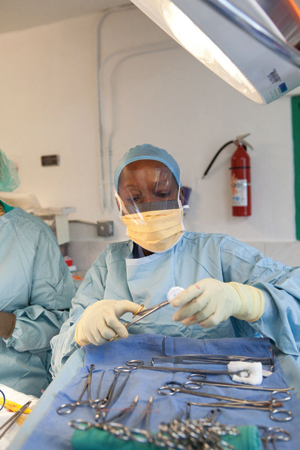 Without her HSC obstetrician to consult, Marise might have taken any number of potentially toxic concoctions offered by the local Voodoo shaman to resolve her growing abdomen issue.
Without her HSC obstetrician to consult, Marise might have taken any number of potentially toxic concoctions offered by the local Voodoo shaman to resolve her growing abdomen issue.
Without surgical intervention, most certainly, 31 year old Marise would not have lived to see her 32nd birthday and her infant daughter would have been one of almost 1 million parentless Haitian children.
